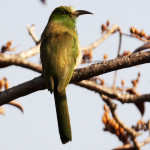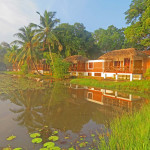Michael Edwards visits The Ginger House Museum Hotel, a property where he can buy his bed and where breakfast is an Indian banquet
No one’s parked their tanks on my lawn but there is a cannon on that swathe of green turf pointing straight at my bedroom. Aimed at the Maharaja style four-poster and a hand-carved teak ceiling, decorated with gold-gilded lotus flowers. That ceiling had been removed from a house in the neighbouring state of Tamil Nadu and reconstructed at the Ginger House Museum Hotel. This is like living in a Merchant Ivory film.
The Ginger House Museum Hotel is a cross between a hotel and an antiques showroom. Think of an Indian special episode of the Antiques Road Show: Fiona Bruce stepping through some 80,000 square feet of chairs, tables, paintings, carved wooden horses celebrating temple festivals and Gods. Lots of statues of Gods.
Then set that scene on the eastern bank of the tidal Lake Vemanbad, India’s largest lake, as it carries wreaths of purple water hyacinths, sometimes topped with white egrets, towards the Arabian Sea.
Owner Majnu says that his nine ornate bedrooms are his showrooms. Antiques aficionados travel from throughout the subcontinent to view his wares. Even as we speak, one of his antique spotters WhatsApps with his latest find. Those nine rooms are frequently fully booked, so Majnu’s builders are working on a further four bedrooms, two of them with gardens on the bank of the lake.


“Everything is for sale,” says George the Hotel Manager, “if you like your bed we can ship it to England for you.” We like it and sleep blissfully on a mattress that cost around three lakhs. But with one lakh worth 10,000 rupees it is a price for Maharajahs rather than humble English travellers.
The cannon on the lawn is an exception to the rule. “Too much bureaucracy to sell working weapons,” asserts Majnu, shaking his head. Nor is the 108 feet long, 120-year-old snake boat starring in the antiques emporium for sale, “It’s a part of Keralan heritage,” says Majnu of a low, long boat used to almost silently deliver dozens of warriors to conflict points in Kerala’s backwaters.
Majnu, who usually has a chat with every guest over breakfast, does not operate from inflexible corporate policy guidelines. “This hotel is God’s will, it is my karma. It doesn’t make business sense to inlay a bathroom with gold tiles but that’s the way I want the hotel to look.”
Nor is there bland corporate hotel decor. Every bedroom is unique and constantly evolving as guests buy a bed, bureau, wardrobe or statue of a God. Mod-cons such as a refrigerator, kettle and beverage tray are usually secreted within dark wood furniture; even the control panel for the air-conditioning is half-obscured by the four-poster bed.


For nearly three centuries this lakeside spot had been the site of a ginger warehouse on a spice route that encouraged traders to moor up in Cochin. The restaurant’s menu keeps the tradition alive, with ginger grilled fish, and for dessert, golden shards of ginger glistening on ginger ice cream.
Majnu is particularly proud of the traditional Indian breakfast that the restaurant serves: fruit platters, eggs, curries, steamed cakes of rice and coconut, paratha breads. If it sounds like a hefty start to the day that’s the way they do things in Kerala, followed by a light lunch and an even lighter supper.
Overlooking Lake Vemanbad, the restaurant with an all-day menu is a favoured drop-in point for visitors to Mattancherry. Particularly as the bar has a license to sell beer and wines, a rarity around these parts.
Some visitors opt for a burger or pasta but why be conventional when there is a huge range of local specialities including roast squid and a vast range of curries? With Indian visitors to Kochi outnumbering overseas visitors, the vegetarian menu is impressively extensive too: vegetable kurma, cashew paneer curry, aloo gobi masala and many more authentic options.
A first-floor roof garden, with a pool and sun-loungers, gives a view over the gardens of red bougainvillea, blue Bengal clock vine and yellow wild allamanda, past the restaurant and onto the Lake.

Mattancherry’s Jewish heritage explains its name from medieval times when European Jews, fleeing from persecution, were welcomed and given land in Kochi. In Hebrew, mattan means gift and cherry translates as settlement.
From the hotel it is a three-minute walk to the grandiose Mattancherry Palace and the Synagogue with its numerous glinting chandeliers. Both walks pass Jew Town’s antiques, arts, crafts and textiles shops.
With hotel manager George instantly able to organise tuk-tuk tours of Fort Kochi’s sights, though the Fort is long gone, the Ginger House Museum Hotel is the place to stay in Kochi.
Tell Me More About The Ginger House Museum Hotel, Kochi, India
The Ginger House Museum Hotel Jew Town Road, Mattancherry, Kochi, Kerala 682002, India.
T: +91 95262 13400 E: museumhotelkochi@gmail.com
Rooms at The Ginger House Museum Hotel from around £230 per night which includes a full Indian breakfast.






